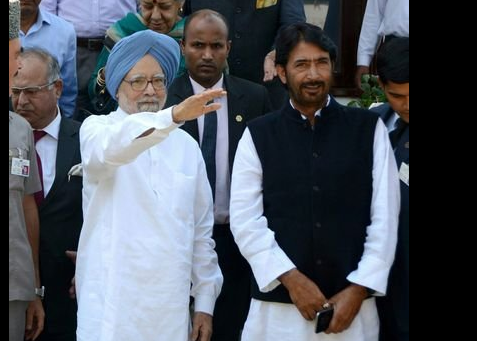
There is grief and anger in the Valley: Ghulam Ahmed Mir

On the morning of August 4, the president of Congress party’s Jammu and Kashmir unit, Ghulam Ahmed Mir, landed at the Indira Gandhi International Airport in New Delhi for a party meet on the situation in the state, which was to be converted into a Union Territory a few hours later.
Just a few hours after he left for the national capital, cops from the Verinag police station landed at Mir’s home with an order to detain him. But, unlike other leaders who were put under house arrest or under restrictions, the serendipitous decision to fly out of the Valley has kept Mir free so far.
In a bid to comply with the orders to present himself at a local police station, Mir returned to Srinagar earlier last week. But, like many other leaders, he was not allowed to leave the airport and put on a flight back to New Delhi.
A day later, he landed in Jammu to be as close to home as possible. The Federal spoke to him on Monday (August 12) for his assessment of the situation, the ramifications of the Centre’s decision to abrogate Jammu and Kashmir’s special status and bifurcate the state into two Union Territories.
Excerpts:
On the mood in Jammu: Initially there were reports that the people of Jammu had celebrated the Centre’s decision. But now, there is complete silence as the ramifications of the state’s bifurcation and withdrawal of special status have started becoming clear.
The people of Jammu have started realising that they would lose their special identity and the jobs that were reserved for them will be thrown open for applicants from across the country. Earlier, they had to compete only with a few hundred people, but now they will have to vie with thousands of eligible candidates.
They have also started realising that the brunt of the decision to repeal Article 35A – a law that didn’t allow outsiders rights to purchase land and seek government jobs in J&K — would be borne by the people of Jammu. Instead of going to the Valley, people from outside would try to compete for the real estate, businesses and jobs in the plains of Jammu.
On Kashmir: There is both gham (grief) and gussa (anger) in the Valley. We do not know its depth and magnitude because of the restrictions on movement and communication. The true picture will emerge only when the lock-down in Kashmir ends.
So far there have not been reports of violent clashes or mass protests. But, this is primarily because the Hurriyat used to control such events through its network and a well-planned calendar of events. Since the Hurriyat leaders are in jail, there is nobody to mobilise people for protests.
Mehbooba Mufti, Omar Abdullah and other mainstream leaders have also been detained. So, in the absence of an organised leadership, the people in the Valley are watching the events unfold. They are currently in a state of shock.
On the possibility of violence: Incidents of stone pelting and terror were orchestrated by militant outfits and Hurriyat leaders in the past. They did this to show their presence and give the impression that theirs was the majority view and voice of the Valley.
By downgrading the state into a UT and removing its special status, the Centre has obviated the need for militants and separatists to assert themselves. With the current mood being what it is, they know that the people of Kashmir are angry with the Indian state. They are hoping this anger will erupt on its own.
I do not think there would be violence in the near future. Once the restrictions are lifted, there will be a reaction. But, the demonstrations are likely to be peaceful and people will find Gandhian ways to carry forward their movement.

